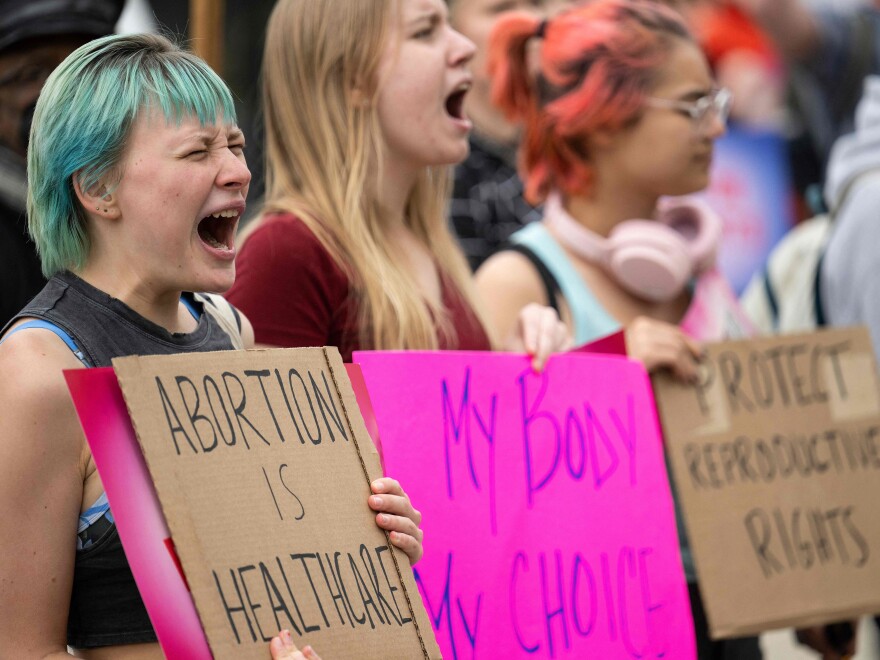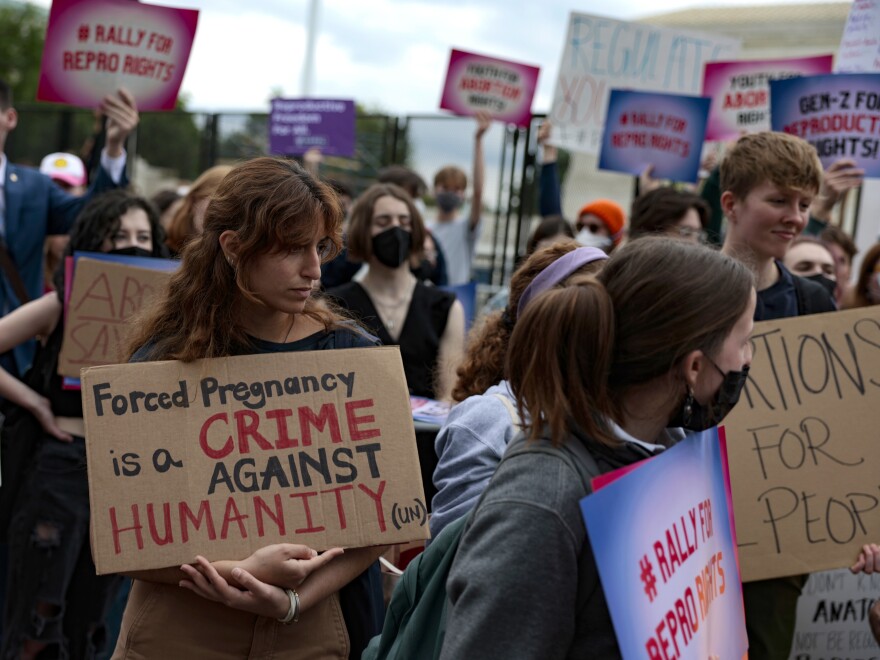Abortion-rights groups across the country experienced a tidal wave of financial support this week after a leaked Supreme Court draft decision to tentatively overturn Roe v. Wade was made public.
Elliott Kozuch, a senior communications strategist with NARAL Pro-Choice America, said donations to the group skyrocketed 1,400% the day after Politico first reported that the Supreme Court may overturn the landmark case, which would leave the fate of abortion rights in the hands of individual states. About half of the supporters were first-time donors, Kozuch told NPR.
The organization raised more online in a single day than ever before, Kozuch said.
ActBlue, a Democratic fundraising platform, said it raised $12 million on Tuesday after the news broke.
The Abortion Care Network said it raised $250,000 since the court's draft decision was leaked, the largest influx of donations the association has seen. The DC Abortion Fund raised "an unprecedented amount of donations" — $132,377 in two days, said Devin Simpson, its communications director.
"Generally, when abortion-related news breaks, we see an unprompted outpouring of support from our community and individual donors. We tend to see a lot of support, particularly on social media, encouraging people to donate to funds specifically," Simpson told NPR.
For one donor, giving was a very personal decision
Madeline Webster, 28-year-old social worker in St. Louis, Mo., donated to a local abortion fund. She said she knows firsthand how important it is to have access to an abortion. She met a fellow student in need during her first week of college at Indiana State University in 2011. The two of them were riding in an elevator when Webster asked her fellow student how she was doing.
The young woman broke down into tears and shared with Webster that she had just found out she was pregnant, Webster said. She said she drove the student to Planned Parenthood, and though she never asked if she had an abortion, Webster said the student didn't appear to be pregnant as the school year came and went.
Webster didn't think much of it until years later when she was sexually assaulted and she too sought help. "I could have been living a really, really different life," she said.
She said she donated because in her eyes it's the least she can do. "It makes me feel a little more like I'm making a difference," she said.
Webster, who said she identifies as a gay woman, said she knows that she doesn't want kids. But for others, she explained, the decision can be complicated and can change over time. Which is why an individual's right to choose whether to move forward with a pregnancy is imperative, Webster said.
"I would never want that option to be taken away from somebody," she said. "At the end of the day, I just don't think it's my business."

The Susan B. Anthony List and March for Life, groups that seek to end abortion, did not respond to NPR's requests for comment.
Donations go beyond funding abortions, helping patients in other ways
Meg Sasse Stern has over 20 years experience working with clinics that offer abortion services, including the Kentucky Health Justice Network, where she spent six years as the support fund director before recently leaving.
Donations go much further than just funding the abortion procedure, she explained. Though some seeking an abortion can find a local clinic, others have to travel hundreds of miles. Donations go to fund airfare, bus tickets, meals, child care and hotels when needed, all of which quickly adds up, Sasse Stern said.
"It becomes a huge undertaking, and for some, abortion isn't always a big or hard decision to make; it's a common decision for people to make, and that's how it should be," Sasse Stern said. "They should be able to just go down the street to get the treatment they need for their condition."
Patients traveling for an abortion often have to take time off of work, which isn't always easy or financially feasible. And patients that are forced to wait find themselves at risk for complications.
"The more barriers someone is facing, the harder it gets," Sasse Stern said. "Those extra weeks are going to be agonizing if not dangerous."
If the Supreme Court goes through with its preliminary decision, abortion rights for patients will vary from state to state. As things stand now, approximately 40 million women of reproductive age live in states that are "hostile" towards abortion rights. More than 20 states could see restrictions or outright abortion bans should Roe be overturned.
Simpson said many abortion-rights funds and clinics have long operated under the assumption that Roe could be overturned. If the court's draft decision should come to pass, he said the DC Abortion Fund will help anyone who comes through its doors.
"Should Roe be overturned in June, DCAF plans to continue to do what we have done for the last 26 years: fund abortions," Simpson said.
Copyright 2022 NPR. To see more, visit https://www.npr.org.




